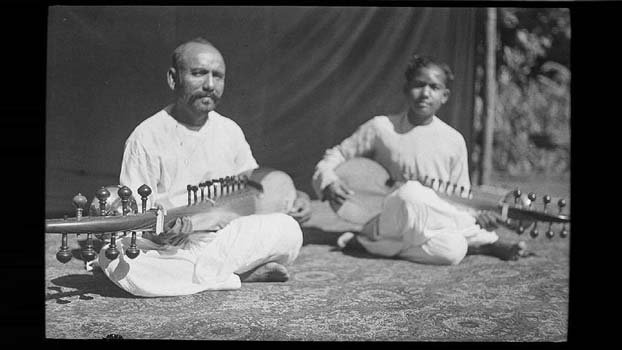The founder of Maihar gharana music: Allauddin Khan

Allauddin Khan was a renowned classical musician of India. He played the sarod. Belonging to a genre of musicians who believed music to be a divine way to reach God, Allaudin Khan was born into a musical family in Brahmanbaria, Bangladesh. He took a liking to music at a very young age. However, his family never wanted him to become a musician, as it was not considered to be a respectable profession.
At the age of ten, he ran away from home and joined a Jatra (vernacular theatre) group. Later he went to Calcutta and became a disciple of Nulu Gopal and after training him for seven rigorous years Nulu Gopal passed away.
While he was in his twenties, the Ustad once found himself in the court of Raja Jagat Kishore. There for the first time, he heard Ustad Ahmad Ali playing the sarod and found his life’s calling. Ustad Ahmad Ali sensed Allauddin’s intense passion for music and made him his disciple.
Taking leave of Ahmad Ali, the Ustad went to Rampur and decided to take lessons from Wazir Khan the guru of the Nawab of Rampur and one of the greatest musicians of those days. But Wazir Khan’s sentry would not allow him in.
In order to draw attention to his plight, the frustrated Ustad threw himself in front of the king’s chariot. When the king learnt about the reason, he was extremely impressed and put Allauddin Khan’s skill to test. Being convinced, he requested his guru to make him his disciple. Wazir Khan helped him acquire all the nuances of the sarod.
Allauddin Khan became the court musician of the Maharaja of Maihar. Here he laid the foundation of a modern Maihar gharana by developing a number of ragas, combining the bass sitar and bass sarod with more traditional instruments and setting up an orchestra. Musicians belonging to the gharana adhere to a dhrupad aesthetic in their approach to playing the alap and jor portions in a raga.
Khan's son Ali Akbar Khan, daughter Annapurna Devi, nephew Raja Hossain Khan and grandson Aashish Khan went on to become musicians. His other disciples include Ravi Shankar, Nikhil Banerjee, Vasant Rai, Pannalal Ghosh, Bahadur Khan, Rabin Ghosh, Sharan Rani, Jotin Bhattacharya, Rajesh Chandra Moitra and W. D. Amaradeva. Khan was awarded the Padma Bhushan in 1958 and the Padma Vibhushan in 1971, India's third and second highest civilian honours, and prior to that in 1954, the Sangeet Natak Akademi awarded him with its highest honour, the Sangeet Natak Akademi Fellowship for lifetime contribution to Indian music.
The entire and integral life of Baba Allauddin Khan, the grand old man of Hindustani classical music, has revolved around three aspects: an unending quest for acquiring true musical knowledge, nurturing the knowledge to the highest level of perfection and imparting extensive taalim(knowledge) to his deserving disciples (Shagirds).
Baba’s last stage performance was in 1959 in Kolkata, and he retired from an active public life and stage in 1961. With a long and luminous life of exceptional creativity behind him, Baba Allauddin Khan lived in Maihar from 1918 until his demise in 1972.



